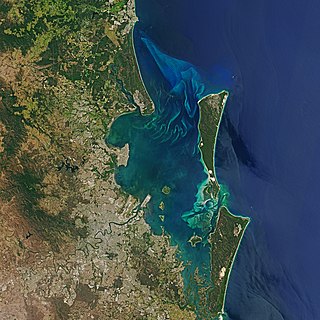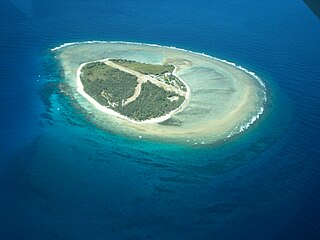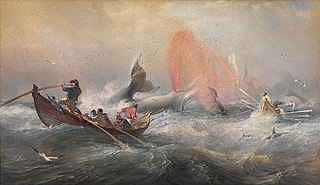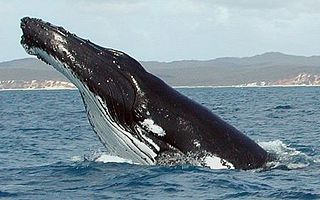
Gheebulum Kunungai is a national park which covers 98% of Moreton Island (Mulgumpin) in Queensland, Australia, 40 km northeast of center of the Brisbane. Its eastern part of he City of Brisbane. It has three main townships, Bulwer, Cowan Cowan and Kooringal.

Moreton Bay is a bay located on the eastern coast of Australia 14 kilometres (8.7 mi) from central Brisbane, Queensland. It is one of Queensland's most important coastal resources. The waters of Moreton Bay are a popular destination for recreational anglers and are used by commercial operators who provide seafood to market.

The humpback whale is a species of baleen whale. It is a rorqual and is the only species in the genus Megaptera. Adults range in length from 14–17 m (46–56 ft) and weigh up to 40 metric tons. The humpback has a distinctive body shape, with long pectoral fins and tubercles on its head. It is known for breaching and other distinctive surface behaviors, making it popular with whale watchers. Males produce a complex song typically lasting 4 to 33 minutes.

Whale watching is the practice of observing whales and dolphins (cetaceans) in their natural habitat. Whale watching is mostly a recreational activity, but it can also serve scientific and/or educational purposes. A study prepared for International Fund for Animal Welfare in 2009 estimated that 13 million people went whale watching globally in 2008. Whale watching generates $2.1 billion per annum in tourism revenue worldwide, employing around 13,000 workers. The size and rapid growth of the industry has led to complex and continuing debates with the whaling industry about the best use of whales as a natural resource.

The southern right whale is a baleen whale, one of three species classified as right whales belonging to the genus Eubalaena. Southern right whales inhabit oceans south of the Equator, between the latitudes of 20° and 60° south. In 2009 the global population was estimated to be approximately 13,600.

Humpback dolphins are members of the genus Sousa. These dolphins are characterized by the conspicuous humps and elongated dorsal fins found on the backs of adults of the species. Humpback dolphins inhabit shallow nearshore waters along coastlines across Australia, Africa, and Asia. Their preference for these habitats exposes them to various human activities such as fisheries entanglement, boat traffic, pollution, and habitat loss. Despite these risks, their nearshore presence facilitates easy observation from land.

Moreton Island (Mulgumpin) is an island on the eastern side of Moreton Bay on the coast of South East Queensland, Australia. The Coral Sea lies on the east coast of the island. Moreton Island lies 58 kilometres (36 mi) northeast of the Queensland capital, Brisbane. 98% of the island is contained within a national park and a popular destination for day trippers, four wheel driving, camping, recreational angling and whale watching and a 75-minute ferry ride from Brisbane. It is the third largest sand island in the world. Together with Fraser Island, Moreton Island forms the largest sand structure in the world. It was the traditional country of the Ngugi before settlement.

King George Sound is a sound on the south coast of Western Australia. Named King George the Third's Sound in 1791, it was referred to as King George's Sound from 1805. The name "King George Sound" gradually came into use from about 1934, prompted by new Admiralty charts supporting the intention to eliminate the possessive 's' from geographical names.

Lady Elliot Island is the southernmost coral cay of the Great Barrier Reef, Australia. The island lies 46 nautical miles north-east of Bundaberg and covers an area of approximately 45 hectares. It is part of the Capricorn and Bunker Group of islands and is owned by the Commonwealth of Australia. The island is home to a small eco resort and an airstrip, which is serviced daily by flights from Bundaberg, Hervey Bay, Brisbane and the Gold Coast.
Holiday Island is an Australian television series made by Crawford Productions for Network Ten. The show aired twice weekly from 1981 to 1982, with the first episode going to air on 17 June 1981.

Moreton Island is the largest locality on the island Moreton Island within the City of Brisbane, Queensland, Australia. In the 2021 census, Moreton Island had a population of 180 people.

Whaling in Australian waters began in 1791 when five of the 11 ships in the Third Fleet landed their passengers and freight at Sydney Cove and then left Port Jackson to engage in whaling and seal hunting off the coast of Australia and New Zealand. The two main species hunted by such vessels in the early years were right and sperm whales. Humpback, bowhead and other whale species would later be taken.

Whaling was one of the first viable industries established in the Swan River Colony following the 1829 arrival of British settlers to Western Australia. The industry had numerous ups and downs until the last whaling station closed in Albany in 1978.

Flinders Reef is a small isolated reef near Moreton Island, 5 kilometres (3 mi) north-east of Cape Moreton in South East Queensland, Australia. It has the highest number of coral species of any subtropical reef system along Australia's east coast and is the nearest true coral reef to Brisbane. Flinders Reef is one of South East Queensland's most popular dive sites. The reef is located within the Moreton Bay Marine Park and is monitored by the Reef Check conservation program. The reef is located within the Tweed–Moreton marine biogeographic region.

Henry Robertson was a Scottish-born Australian seaman, engineer, folk-singer/songwriter, poet and activist, who became a key figure in the development of the Australian folk music tradition. During the 1950s he served in commercial whaling fleets in both sub-antarctic and sub-tropical regions, and wrote a number of songs about his experiences which formed the basis of his 1971 LP release Whale Chasing Men: Songs of Whaling in Ice and Sun, a unique record of life in the whaling industry in the 20th century. He also composed and performed songs on a range of other subjects, including compositions for historical documentaries commissioned by Australian television, a number of which have since been recorded posthumously by musicians interested in perpetuating his musical legacy.

Tourism in Brisbane is an important industry for the Queensland economy, being the third-most popular destination for international tourists after Sydney and Melbourne.
Housed in Brisbane's heritage listed Naval Stores, Riverlife is an adventure centre on the Kangaroo Point of Brisbane in Queensland, Australia providing leisure activities. It can be found via Lower River Terrance and is known for its guided kayaking tours, rock climbing instruction, and abseiling. It also offers equipment hire for, such as kayaks, mountain bikes, kick scooters and rollerblades.

Whale watching in Australia is a popular recreational pursuit and a tourist activity along various coasts. In 2008, whale and dolphin watching was worth an estimated A$31 million in direct expenditure to the Australian economy with an estimated 1.6 million tourists participating in the activity. Humpback whales are the most common species seen in the waters surrounding Australia while southern right whales, minke whales and blue whales are also seen.

Whale watching in New Zealand is predominantly centred around the areas of Kaikōura and the Hauraki Gulf. Known as the 'whale capital', Kaikōura is a world-famous whale watching site, in particular for sperm whales which is currently the most abundant of large whales in New Zealand waters. The Hauraki Gulf Marine Park is also a significant whale watching area with a resident population of Bryde's Whales commonly viewed alongside other cetaceans Common Dolphins, Bottlenose Dolphins and Orca. Whale watching is also offered in other locations, often as eco-tours and in conjunction with dolphin watching. Land-based whale watching from New Zealand's last whaling station, which closed in 1964, is undertaken for scientific purposes, mostly by ex-whalers.
Kooringal is a coastal town and locality on the south-west coast of Moreton Island within the City of Brisbane, Queensland, Australia. In the 2021 census, the locality of Kooringal had a population of 43 people.




















